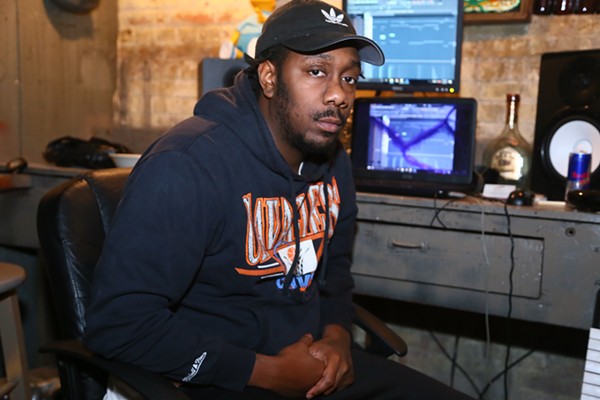Lived Experience Grounds Local Rapper Kipp Stone's Debut Album
By Lawrence Neil on Fri, Dec 8, 2017 at 7:57 am
[
{
"name": "Ad - NativeInline - Injected",
"component": "38482495",
"insertPoint": "3",
"requiredCountToDisplay": "5"
},{
"name": "Real 1 Player (r2) - Inline",
"component": "38482494",
"insertPoint": "2/3",
"requiredCountToDisplay": "9"
}
]
Rapper Kipp Stone opens the door of his East Cleveland home in an Adidas hat and tracksuit bottoms, and a dark Cavs sweater. He winds downstairs to a concrete-floored basement, the room occupied by laundry machines and bisected by a few sheets hung from the ceiling.
With a sweeping hand, Stone unveils his laboratory behind the partition. A black leather L-couch dotted with ashtrays takes up one side, punctuated by his producer/engineer/right hand man Blokhead Johnny. The other half is populated by speakers, a makeshift microphone booth, and a laptop with an spiderweb-cracked screen. The basement windows are shrouded with vintage Fendi sheets. A Bart Simpson doll sits askew behind a monitor. It seems easy to lose track of the world in this place, and Stone, self-described as a separatist, doesn’t let many folks in.
Despite East Cleveland’s disproportionate influence on Cleveland’s rap scene (the city of 17,000 has produced Ray Jr., Doe Boy and Pooh Gutta, among others), Stone keeps a tight, self-sufficient circle. Johnny and Jason Anderson serve as his producers, and his management is handled by a hefty tag-team: Truth Walker is one of Cleveland’s few serial managers, previously working with Corey Bapes, Chip the Ripper, Tezo and Bankie Iz; Ryan Cunningham, a publicist with the national PR firm Biz3, came on in 2015 as a manager and serves as a national connection for Kipp’s sound.
In house shoes, Stone trudges to the couch, falls into it and lights a Newport.
He’s tall and scruffy. A stubbled beard crawls up his cheeks, and his eyes are heavy-lidded from a marathon recording session the previous night. His right brow bears a thick twist of scars from a 2010 car accident. His speaking voice is subdued and gravelly, the result of years of cigarettes and keeping to himself.
Stone’s debut album, Dirty Face Angel, comes out today through indie distributor Empire. The 12-track project sweats longing and shouts desperation. It’s knotted with angst. It’s really good.
It’s a portrait of struggle that eludes cliche. Written in the solitude of Stone’s bedroom or on bus trips leaned against frosty RTA windows, D.F.A. is grounded in vivid lived experience. “Speak life, it’s my native tongue / You can’t treat it like it’s only music,” Stone raps in “Celebration,” an immediate stand-out on the project whose shiny veneer betrays its wrenching lyrics, “All my life I’ve spent trying to feel something / Maybe I should just disappear or something.”
Stone’s dexterous flow teems with sonic texture, multisyllabic and internal rhymes, his bars bursting with lines that are at once playfully loose and surgically precise. “All the fake cannot be chipped away/It’s better off obliterated/Into pieces, boxed up and shipped away,” he maneuvers on “7 Dayz” over an eerie, twangy guitar.
Stone is versatile on the mic, as comfortable in a swinging, pocketed boom-bap flow as he with a teetering, rapid-fire delivery. His lilt blends Scarface growl and 2Pac’s delicate sing-song but also evokes Kendrick and Schoolboy Q in syncopation and delivery. He pushes tracks over six minutes in an era where it-kid Soundcloud rappers are clocking in under two. The result is simmering, dense and rich.
The title track kicks off the album with an urging, beseeching repeating chorus from the twice-featured singer Vari — “Why me? Why me?” — as Stone riffs above it, “I love the cash, but I hate what the cash do.” It’s compact and upwards-gazing. On “High Road,” a silky, textured refrain from singer NIIA ripples over gurgling, 808-textured spidery pianos, Japanese strings and complex keyboard chords. Stone delivers quotables again, “Sacrifice them sand castles for them coliseums, boy, I’m talking mad vision.”
The hard-hitting “Shoebox” feels like a Kendrick reference track, while the sole rap feature, local rapper Nuke Franklin, squeaks up into harmonics on a sneering, neck-snapping guest verse over one of the project’s grittiest trap beats in “Megatron.”
Another highlight, “B.I.N.S.I.,” flips a soul sample into an extended melancholic exhortation, tightly wound and pain-tinged. “By a show of hands, who was on the farm when the boy was dead broke?” Stone raps. “Who was there to talk me out banging and selling dope? Who I’m tagging in when Satan got me on the ropes? Case closed.”
These poignant moments of personal brinksmanship create a cohesive tone for D.F.A., one that speaks to grey area between good and bad, right and wrong, dirty and angelic. Kipp uses these 12 tracks to shine a light on that pivot point.
“To me, I know people called ‘criminals’ who are really good people. They’re giving people, people that have helped me in ways that I couldn’t even really begin to talk about. These guys were positive influences in my life, driven by circumstance. The stigma about criminals is that they’re bad people – ‘Throw 'em in jail, throw away the key.’ I don’t see street dudes like that.
“But it’s also me and my temptations,” Stone continues. His own face appears on the album’s cover, inked with tattoos like “PAIN PAIN PAIN,” “Death,” and “Hope.” “We’re always broke as fuck, and we’re always saying we should start selling dope or something because something’s gotta shake. That temptation is crazy, especially when you know you could make a killing if you wanted to.
“It’s that duality. It’s the dichotomy of a street dude. It’s my good side and my bad side.”
To add to the undergirding experience Stone alludes to throughout the album, the recording happened on the thinnest of shoestrings.
“Lots has to do with the actual circumstances creating the tape in Chicago,” Stone explains. “We were down bad when we were out there.”
Kipp and Blokhead Johnny were scraping the bottom when they recorded the album last winter in the Windy City. Kipp, who was previously signed with Chicago indie darling Closed Sessions, had free studio time from the label and slept in the studio. But when Johnny left his wallet on the bus and after buying beat packs for the album, they were both down to $20 each for a week’s worth of food.
“For a week, we were living off Cheerios, ramen noodles, and hella Doritos,” the pair say, shaking their heads. They guzzled studio-provided Red Bull, and nabbed whatever leftover bottle of brown liquor they could find around the space.
Luckily, Johnny ended up flipping a small trove of beats, and they were able to eat properly for the last few days of the recording. The proof is in the pudding: Dirty Face Angel is a full meal, one that takes time to digest. In the end, however, it's delicious, nuanced and nourishing.
And while Stone mulls over just disappearing, it’s another of his rapped appeals — for the world to “Pay attention to a broken nigga from a broken city full of broken dreams” — that we hope will come true instead. With a vulnerable, skill-laden, full-hearted album like this one under his belt, it feels likely.
With a sweeping hand, Stone unveils his laboratory behind the partition. A black leather L-couch dotted with ashtrays takes up one side, punctuated by his producer/engineer/right hand man Blokhead Johnny. The other half is populated by speakers, a makeshift microphone booth, and a laptop with an spiderweb-cracked screen. The basement windows are shrouded with vintage Fendi sheets. A Bart Simpson doll sits askew behind a monitor. It seems easy to lose track of the world in this place, and Stone, self-described as a separatist, doesn’t let many folks in.
Despite East Cleveland’s disproportionate influence on Cleveland’s rap scene (the city of 17,000 has produced Ray Jr., Doe Boy and Pooh Gutta, among others), Stone keeps a tight, self-sufficient circle. Johnny and Jason Anderson serve as his producers, and his management is handled by a hefty tag-team: Truth Walker is one of Cleveland’s few serial managers, previously working with Corey Bapes, Chip the Ripper, Tezo and Bankie Iz; Ryan Cunningham, a publicist with the national PR firm Biz3, came on in 2015 as a manager and serves as a national connection for Kipp’s sound.
In house shoes, Stone trudges to the couch, falls into it and lights a Newport.
He’s tall and scruffy. A stubbled beard crawls up his cheeks, and his eyes are heavy-lidded from a marathon recording session the previous night. His right brow bears a thick twist of scars from a 2010 car accident. His speaking voice is subdued and gravelly, the result of years of cigarettes and keeping to himself.
Stone’s debut album, Dirty Face Angel, comes out today through indie distributor Empire. The 12-track project sweats longing and shouts desperation. It’s knotted with angst. It’s really good.
It’s a portrait of struggle that eludes cliche. Written in the solitude of Stone’s bedroom or on bus trips leaned against frosty RTA windows, D.F.A. is grounded in vivid lived experience. “Speak life, it’s my native tongue / You can’t treat it like it’s only music,” Stone raps in “Celebration,” an immediate stand-out on the project whose shiny veneer betrays its wrenching lyrics, “All my life I’ve spent trying to feel something / Maybe I should just disappear or something.”
Stone’s dexterous flow teems with sonic texture, multisyllabic and internal rhymes, his bars bursting with lines that are at once playfully loose and surgically precise. “All the fake cannot be chipped away/It’s better off obliterated/Into pieces, boxed up and shipped away,” he maneuvers on “7 Dayz” over an eerie, twangy guitar.
Stone is versatile on the mic, as comfortable in a swinging, pocketed boom-bap flow as he with a teetering, rapid-fire delivery. His lilt blends Scarface growl and 2Pac’s delicate sing-song but also evokes Kendrick and Schoolboy Q in syncopation and delivery. He pushes tracks over six minutes in an era where it-kid Soundcloud rappers are clocking in under two. The result is simmering, dense and rich.
The title track kicks off the album with an urging, beseeching repeating chorus from the twice-featured singer Vari — “Why me? Why me?” — as Stone riffs above it, “I love the cash, but I hate what the cash do.” It’s compact and upwards-gazing. On “High Road,” a silky, textured refrain from singer NIIA ripples over gurgling, 808-textured spidery pianos, Japanese strings and complex keyboard chords. Stone delivers quotables again, “Sacrifice them sand castles for them coliseums, boy, I’m talking mad vision.”
The hard-hitting “Shoebox” feels like a Kendrick reference track, while the sole rap feature, local rapper Nuke Franklin, squeaks up into harmonics on a sneering, neck-snapping guest verse over one of the project’s grittiest trap beats in “Megatron.”
Another highlight, “B.I.N.S.I.,” flips a soul sample into an extended melancholic exhortation, tightly wound and pain-tinged. “By a show of hands, who was on the farm when the boy was dead broke?” Stone raps. “Who was there to talk me out banging and selling dope? Who I’m tagging in when Satan got me on the ropes? Case closed.”
These poignant moments of personal brinksmanship create a cohesive tone for D.F.A., one that speaks to grey area between good and bad, right and wrong, dirty and angelic. Kipp uses these 12 tracks to shine a light on that pivot point.
“To me, I know people called ‘criminals’ who are really good people. They’re giving people, people that have helped me in ways that I couldn’t even really begin to talk about. These guys were positive influences in my life, driven by circumstance. The stigma about criminals is that they’re bad people – ‘Throw 'em in jail, throw away the key.’ I don’t see street dudes like that.
“But it’s also me and my temptations,” Stone continues. His own face appears on the album’s cover, inked with tattoos like “PAIN PAIN PAIN,” “Death,” and “Hope.” “We’re always broke as fuck, and we’re always saying we should start selling dope or something because something’s gotta shake. That temptation is crazy, especially when you know you could make a killing if you wanted to.
“It’s that duality. It’s the dichotomy of a street dude. It’s my good side and my bad side.”
To add to the undergirding experience Stone alludes to throughout the album, the recording happened on the thinnest of shoestrings.
“Lots has to do with the actual circumstances creating the tape in Chicago,” Stone explains. “We were down bad when we were out there.”
Kipp and Blokhead Johnny were scraping the bottom when they recorded the album last winter in the Windy City. Kipp, who was previously signed with Chicago indie darling Closed Sessions, had free studio time from the label and slept in the studio. But when Johnny left his wallet on the bus and after buying beat packs for the album, they were both down to $20 each for a week’s worth of food.
“For a week, we were living off Cheerios, ramen noodles, and hella Doritos,” the pair say, shaking their heads. They guzzled studio-provided Red Bull, and nabbed whatever leftover bottle of brown liquor they could find around the space.
Luckily, Johnny ended up flipping a small trove of beats, and they were able to eat properly for the last few days of the recording. The proof is in the pudding: Dirty Face Angel is a full meal, one that takes time to digest. In the end, however, it's delicious, nuanced and nourishing.
And while Stone mulls over just disappearing, it’s another of his rapped appeals — for the world to “Pay attention to a broken nigga from a broken city full of broken dreams” — that we hope will come true instead. With a vulnerable, skill-laden, full-hearted album like this one under his belt, it feels likely.
Tags:
SCENE Supporters make it possible to tell the Cleveland stories you won’t find elsewhere.
Become a supporter today.
Scroll to read more Music News articles
Newsletters
Join Cleveland Scene Newsletters
Subscribe now to get the latest news delivered right to your inbox.













